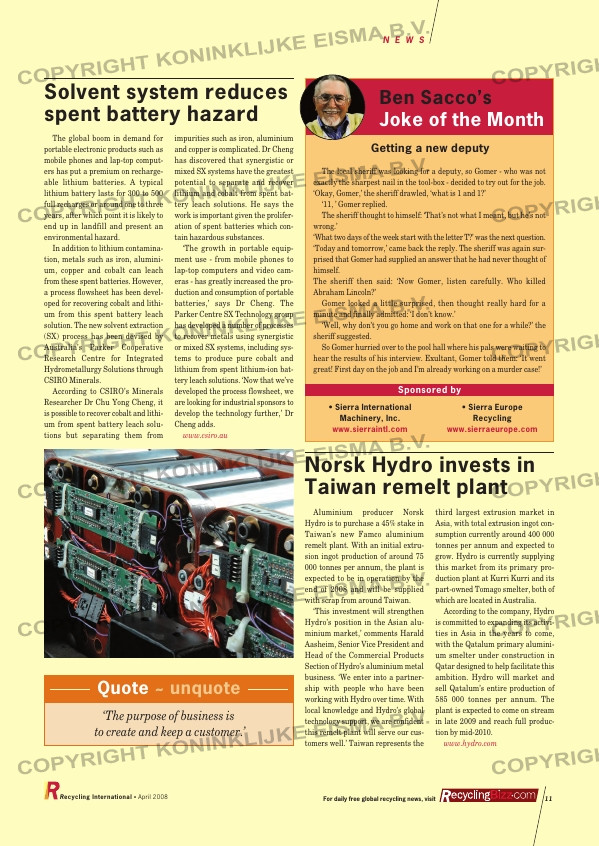Page 11 from: April 2008

N E W S
Recycling International • April 2008 11
Getting a new deputy
The local sheriff was looking for a deputy, so Gomer – who was not
exactly the sharpest nail in the tool-box – decided to try out for the job.
‘Okay, Gomer,’ the sheriff drawled, ‘what is 1 and 1?’
‘11, ’ Gomer replied.
The sheriff thought to himself: ‘That’s not what I meant, but he’s not
wrong.’
‘What two days of the week start with the letter T?’ was the next question.
‘Today and tomorrow,’ came back the reply. The sheriff was again sur-
prised that Gomer had supplied an answer that he had never thought of
himself.
The sheriff then said: ‘Now Gomer, listen carefully. Who killed
Abraham Lincoln?’
Gomer looked a little surprised, then thought really hard for a
minute and finally admitted: ‘I don’t know.’
‘Well, why don’t you go home and work on that one for a while?’ the
sheriff suggested.
So Gomer hurried over to the pool hall where his pals were waiting to
hear the results of his interview. Exultant, Gomer told them: ‘It went
great! First day on the job and I’m already working on a murder case!’
Ben Sacco’s
Joke of the Month
Sponsored by
• Sierra International
Machinery, Inc.
www.sierraintl.com
• Sierra Europe
Recycling
www.sierraeurope.com
Solvent system reduces
spent battery hazard
The global boom in demand for
portable electronic products such as
mobile phones and lap-top comput-
ers has put a premium on recharge-
able lithium batteries. A typical
lithium battery lasts for 300 to 500
full recharges or around one to three
years, after which point it is likely to
end up in landfill and present an
environmental hazard.
In addition to lithium contamina-
tion, metals such as iron, alumini-
um, copper and cobalt can leach
from these spent batteries. However,
a process flowsheet has been devel-
oped for recovering cobalt and lithi-
um from this spent battery leach
solution. The new solvent extraction
(SX) process has been devised by
Australia’s Parker Cooperative
Research Centre for Integrated
Hydrometallurgy Solutions through
CSIRO Minerals.
According to CSIRO’s Minerals
Researcher Dr Chu Yong Cheng, it
is possible to recover cobalt and lithi-
um from spent battery leach solu-
tions but separating them from
impurities such as iron, aluminium
and copper is complicated. Dr Cheng
has discovered that synergistic or
mixed SX systems have the greatest
potential to separate and recover
lithium and cobalt from spent bat-
tery leach solutions. He says the
work is important given the prolifer-
ation of spent batteries which con-
tain hazardous substances.
‘The growth in portable equip-
ment use – from mobile phones to
lap-top computers and video cam-
eras – has greatly increased the pro-
duction and consumption of portable
batteries,’ says Dr Cheng. The
Parker Centre SX Technology group
has developed a number of processes
to recover metals using synergistic
or mixed SX systems, including sys-
tems to produce pure cobalt and
lithium from spent lithium-ion bat-
tery leach solutions. ‘Now that we’ve
developed the process flowsheet, we
are looking for industrial sponsors to
develop the technology further,’ Dr
Cheng adds.
www.csiro.au
Norsk Hydro invests in
Taiwan remelt plant
Aluminium producer Norsk
Hydro is to purchase a 45% stake in
Taiwan’s new Famco aluminium
remelt plant. With an initial extru-
sion ingot production of around 75
000 tonnes per annum, the plant is
expected to be in operation by the
end of 2008 and will be supplied
with scrap from around Taiwan.
‘This investment will strengthen
Hydro’s position in the Asian alu-
minium market,’ comments Harald
Aasheim, Senior Vice President and
Head of the Commercial Products
Section of Hydro’s aluminium metal
business. ‘We enter into a partner-
ship with people who have been
working with Hydro over time. With
local knowledge and Hydro’s global
technology support, we are confident
this remelt plant will serve our cus-
tomers well.’ Taiwan represents the
third largest extrusion market in
Asia, with total extrusion ingot con-
sumption currently around 400 000
tonnes per annum and expected to
grow. Hydro is currently supplying
this market from its primary pro-
duction plant at Kurri Kurri and its
part-owned Tomago smelter, both of
which are located in Australia.
According to the company, Hydro
is committed to expanding its activi-
ties in Asia in the years to come,
with the Qatalum primary alumini-
um smelter under construction in
Qatar designed to help facilitate this
ambition. Hydro will market and
sell Qatalum’s entire production of
585 000 tonnes per annum. The
plant is expected to come on stream
in late 2009 and reach full produc-
tion by mid-2010.
www.hydro.com
‘The purpose of business is
to create and keep a customer.’
Quote ~ unquote
For daily free global recycling news, visit
RI_020 NEWS:Opmaak 1 04-04-2008 09:53 Pagina 11



